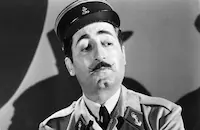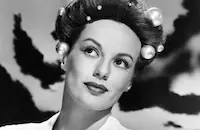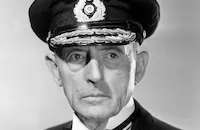In Our Time

Brief Synopsis
Cast & Crew
Vincent Sherman
Ida Lupino
Paul Henreid
Nancy Coleman
Mary Boland
Victor Francen
Film Details
Technical Specs

Synopsis
In March, 1939, Mrs. Bromley, an English decorator, and her assistant, Jennifer Whittredge, travel through Poland in search of antiques. When they reach Warsaw, Jenny is left on her own while Mrs. Bromley haggles with an antique dealer. Passing by the window of the store, Count Stephan Orvid mistakes Jenny for a clerk and asks to see a musical watch. Jenny explains that she is not a clerk, but is prevented from getting to know Stephan better by the return of Mrs. Bromley. Later that same night, Jenny and Mrs. Bromley run into Stephan at the opera, and Stephan invites Jenny to join him afterward for supper. Although Jenny gets very drunk at supper, Stephan realizes that she is not just a cheap pickup, and insists on showing her Warsaw the next day. After a week of sightseeing, Stephan asks Jenny to marry him and she accepts. Things do not go smoothly, however, when Stephan brings Jenny to meet his aristocratic family. Although Uncle Leopold believes that Jenny will bring new energy into the family, he is too concerned about the massing of German troops on the Czechoslovakian border to offer much support. Stephan's sister Janina looks down on Jenny, as does his mother Zofya. The head of the family, Stephan's uncle Pavel, a Nazi sympathizer, is opposed to the marriage, and presents an unpleasant picture of the consequences of the marriage on Stephan's career. Afterward, Jenny runs away, planning to return to England with Mrs. Bromley. Stephan finds Jenny at the station and convinces her to marry him and help him become independent. Together they mechanize the family's farming estate and arrange to share the profits with the peasants. Later, during a harvest party, Pavel accuses Jenny of destroying the family's traditions and insists that as the head of the family, he be consulted before more changes are made. Before Stephan can respond, bombs are heard in the distance, and the family realizes that despite Poland's non-aggression treaty with Germany, Warsaw is being bombed. Stephan's cavalry regiment is then called up, and Jenny busies herself with the harvest. One night, Stephan returns home after his entire regiment is destroyed by German tanks. Then, over the radio, a call goes out for all citizens to defend Warsaw against the Germans. With the approval of the peasants, Stephan burns the harvest and the house so that the Germans will not be able to use them. Janina, Zofya and Pavel prepare to leave the country and beg Stephan and Jenny to accompany them. Stephan refuses, however. Twenty-eight days later, the city falls, and Stephan and Jenny join the flocks of refugees who are leaving the city to wait for the day that Poland is once again free.

Director

Vincent Sherman
Cast

Ida Lupino

Paul Henreid

Nancy Coleman

Mary Boland

Victor Francen

Nazimova

Michael Chekhov
Ivan Triesault
Leonid Snegoff
Marek Windheim
Shimen Ruskin
Ivan Lebedeff

Lynne Baggett

Faye Emerson
Walter Palm
William Gymes
Mary Landa
Max Willenz
Curt Furberg
Hans Tanzler
Julius Cramer
Alex Akimoff
Waclaw Rekwart

Frank Reicher
Michael Visaroff
Richard Ordynski
John Bleifer
Lotte Palfi
Sylvia Arslan
Peter Helmers
Wolfgang Zilzer
Mae Packer
Irina Semochenko
Mici Goty
Sonia Levkova
Janna De Loos
Crew
Milo Anderson
Stephen Barasch
Robert Burks
Rudi Fehr
Leo F. Forbstein
Carl Guthrie
William Kissel
Howard Koch
James Leicester
Frank Mattison
Leon Raab
Hugh Reticker
Clare A. Riggs
Casey Roberts
Ellis St. Joseph
Jerry Wald
Jack L. Warner
Franz Waxman
Perc Westmore

Videos
Movie Clip




Trailer
Film Details
Technical Specs

Articles
In Our Time
Just 25 years old, Ida Lupino had been under contract at Warner Bros. since 1940, and already had a string of impressive performances behind her, in films such as They Drive by Night (1940) and High Sierra (1941), often playing highly neurotic characters. The role of a naive Englishwoman who becomes a patriotic Polish wife was something of a departure for her. At Lupino's urging, Wald had selected Vincent Sherman, who had directed Lupino in one of her best films, The Hard Way (1943), to direct In Our Time. A former theater actor and director, Sherman had appeared in a small role in Russian actress Alla Nazimova's 1931 stage production of The Good Earth. Nazimova had been a legendary stage and silent screen star, and had turned to producing her own films in the early 1920s. But her highly stylized "art" films like Salome (1923) were not successful, and she returned to the theater. In 1940, suffering from health and financial problems, Nazimova returned to Hollywood and began playing supporting roles in films. Sherman cast her as Henreid's aristocratic mother (billed merely as "Nazimova") in In Our Time. It would be one of her last film appearances - she died the following year.
Sherman also cast another expatriate, Russian Michael Chekhov, in In Our Time as Nazimova's brother. Like Nazimova, Chekhov - the nephew of playwright Anton Chekhov - was a disciple of director and acting teacher Konstantin Stanislavsky, and was himself a distinguished theater actor, director, and teacher. Henreid recalled that Chekhov had an emotional scene in the film where he urges Henreid and Lupino's characters to go on fighting. According to Henreid, during rehearsal, Chekhov delivered it simply but movingly, with no tears or histrionics. Henreid, Lupino and Nazimova spontaneously applauded, but Sherman directed him to ham it up, adding sniffles and other bits of business. Later, Henreid asked Chekhov how he could allow Sherman to ruin his performance. Chekhov replied, "I've played Shakespeare, Ibsen, Shaw, Goethe....I don't feel it's important to argue about a piece of second-rate writing." Chekhov's best-known screen role was as the psychiatrist in Spellbound (1945), which earned him an Academy Award nomination. His students included Marilyn Monroe, Gregory Peck, Elia Kazan, Ingrid Bergman, Gary Cooper, and Clint Eastwood.
Made as the war raged overseas, In Our Time featured cast members who were themselves refugees from the conflict in Europe. Henreid had fled his native Austria in the mid-1930s because of his anti-Nazi beliefs, settling first in England, then in the U.S. During the production of In Our Time, he was shocked to learn that a director friend had been executed at Dachau on charges of treason, and another friend, a writer, had been beaten to death by the Gestapo. Belgian-born character actor Victor Francen, who played Henreid's Nazi sympathizer uncle in In Our Time, had been one of the top stars of the French theater and cinema. He left France for the U.S. at the beginning of the war, and frequently played Nazis in Hollywood wartime films.
Critics generally agreed with Vincent Sherman's assessment of In Our Time, and some compared it unfavorably to the work of Michael Chekhov's playwright uncle. "Chekhov is dead and the flavor of Chekhovian theatre is out of date," Bosley Crowther wrote in the New York Times. "Why try to beat the dead animal as they do in this new film?" Crowther's response, perhaps, says more about his attitude toward Chekhov than about the film. The Time critic was more appreciative about what the film was trying to achieve: "Because it is sincerely written and carefully acted, notably by Miss Lupino, and because Vincent Sherman is one Hollywood director who tries to make every shot count, In Our Time manages now & then to give domestic point to the political drama in the background. But much of it is too purely domestic, and some of it suggests a blunted, insensitive imitation of Chekhov."
Director: Vincent Sherman
Producer: Jerry Wald
Screenplay: Ellis St. Joseph, Howard Koch
Cinematography: Carl Guthrie
Editor: Rudi Fehr
Costume Design: Milo Anderson
Art Direction: Hugh Reticker
Music: Franz Waxman
Principal Cast: Ida Lupino (Jennifer Whittredge), Paul Henreid (Count Stephen Orvid), Nancy Coleman (Janina Orvid), Mary Boland (Mrs. Bromley), Victor Francen (Count Pavel Orvid), Nazimova (Zofya Orvid), Michael Chekhov (Uncle Leopold).
BW-111m. Closed captioning.
by Margarita Landazuri















